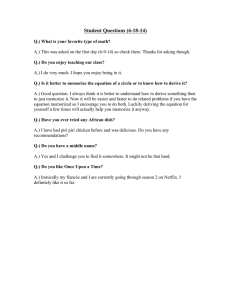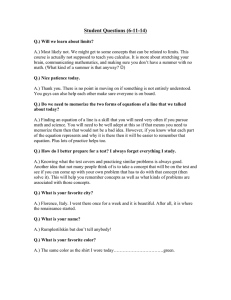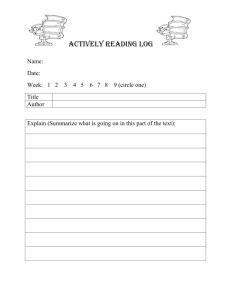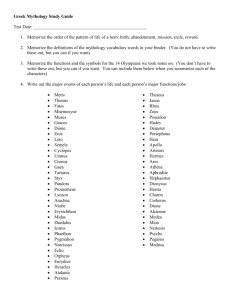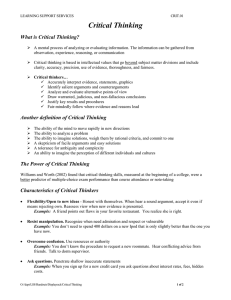MEMORY IMPROVEMENT STRATEGIES
advertisement
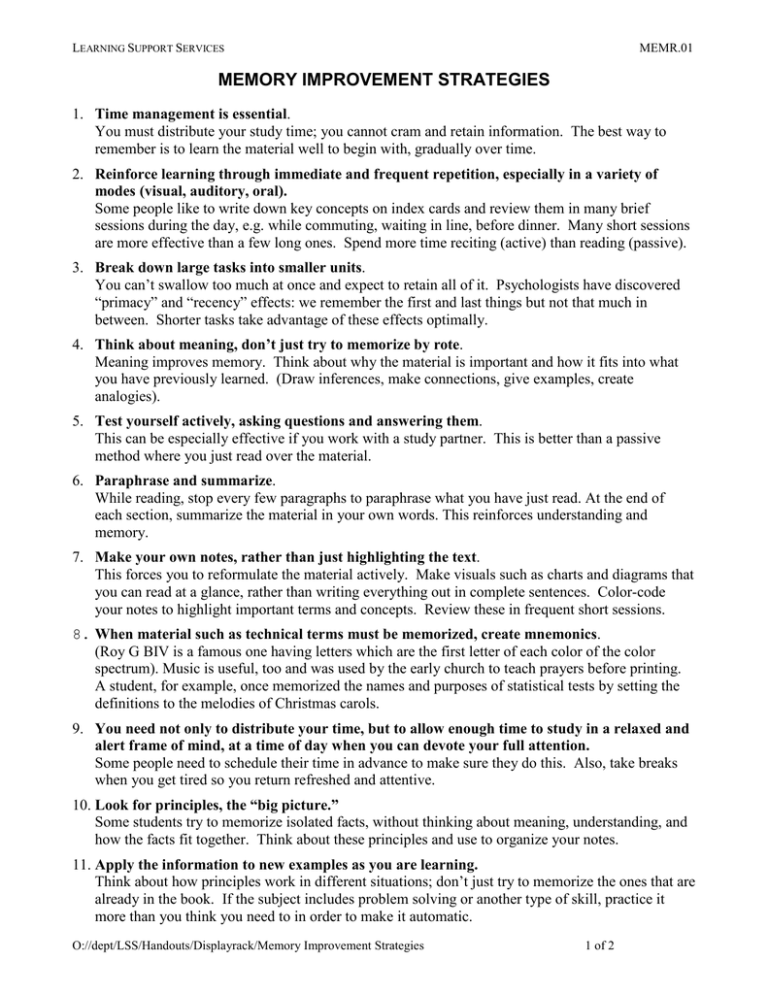
LEARNING SUPPORT SERVICES MEMR.01 MEMORY IMPROVEMENT STRATEGIES 1. Time management is essential. You must distribute your study time; you cannot cram and retain information. The best way to remember is to learn the material well to begin with, gradually over time. 2. Reinforce learning through immediate and frequent repetition, especially in a variety of modes (visual, auditory, oral). Some people like to write down key concepts on index cards and review them in many brief sessions during the day, e.g. while commuting, waiting in line, before dinner. Many short sessions are more effective than a few long ones. Spend more time reciting (active) than reading (passive). 3. Break down large tasks into smaller units. You can’t swallow too much at once and expect to retain all of it. Psychologists have discovered “primacy” and “recency” effects: we remember the first and last things but not that much in between. Shorter tasks take advantage of these effects optimally. 4. Think about meaning, don’t just try to memorize by rote. Meaning improves memory. Think about why the material is important and how it fits into what you have previously learned. (Draw inferences, make connections, give examples, create analogies). 5. Test yourself actively, asking questions and answering them. This can be especially effective if you work with a study partner. This is better than a passive method where you just read over the material. 6. Paraphrase and summarize. While reading, stop every few paragraphs to paraphrase what you have just read. At the end of each section, summarize the material in your own words. This reinforces understanding and memory. 7. Make your own notes, rather than just highlighting the text. This forces you to reformulate the material actively. Make visuals such as charts and diagrams that you can read at a glance, rather than writing everything out in complete sentences. Color-code your notes to highlight important terms and concepts. Review these in frequent short sessions. 8. When material such as technical terms must be memorized, create mnemonics. (Roy G BIV is a famous one having letters which are the first letter of each color of the color spectrum). Music is useful, too and was used by the early church to teach prayers before printing. A student, for example, once memorized the names and purposes of statistical tests by setting the definitions to the melodies of Christmas carols. 9. You need not only to distribute your time, but to allow enough time to study in a relaxed and alert frame of mind, at a time of day when you can devote your full attention. Some people need to schedule their time in advance to make sure they do this. Also, take breaks when you get tired so you return refreshed and attentive. 10. Look for principles, the “big picture.” Some students try to memorize isolated facts, without thinking about meaning, understanding, and how the facts fit together. Think about these principles and use to organize your notes. 11. Apply the information to new examples as you are learning. Think about how principles work in different situations; don’t just try to memorize the ones that are already in the book. If the subject includes problem solving or another type of skill, practice it more than you think you need to in order to make it automatic. O://dept/LSS/Handouts/Displayrack/Memory Improvement Strategies 1 of 2 LEARNING SUPPORT SERVICES MEMR.01 12. Prior knowledge This plays a big role in the ability to store and retrieve info from long term memory. Any time a reader can relate the incoming material to something they already know they are better able to understand the info – relating to personal experience is most meaningful. a. Reading text before lecture is important b. Previewing the chapter before reading helps with understanding and retention 13. Use your Body – Learn actively a. Action is a great memory enhancer. We remember 90% of what we do, 75% of what we see, and 20% of what we hear. b. Stand while testing or applying theories you learned in Psychology c. Pace while reciting aloud – d. Teach material to an imaginary audience – no notes. This will test your recall. 14. Study during Daylight a. Most difficult subjects b. Most people can concentrate more effectively 15. Remember Something Else a. When you can’t remember something that you’re sure you know, remember something else that is related. b. Info is stored in the same are of the brain as similar info. You can unblock your recall by stimulating that area of your memory. c. A brainstorm can be a good memory jog. 16. Intention to Remember can be more powerful than any memory technique. a. Be positive! Instead of saying, “I don’t remember,” you can say, “It will come to me”. b. The latter statement implies that the info you want ids stored in your mind and you can retrieve it. Adapted from: Gourgey, Annette: Open Forum for Learning Assistance Professionals & Ellis, D. (2003). Becoming a master student (10th ed.). Boston: Houghton Mifflin Company. Rev. 7/2008 O://dept/LSS/Handouts/Displayrack/Memory Improvement Strategies 2 of 2
